For the 2025 school year, there are 4 public schools serving 1,422 students in Wabash CUSD 348 School District. This district's average testing ranking is 4/10, which is in the bottom 50% of public schools in Illinois.
Public Schools in Wabash CUSD 348 School District have an average math proficiency score of 13% (versus the Illinois public school average of 26%), and reading proficiency score of 25% (versus the 30% statewide average).
Minority enrollment is 8% of the student body (majority Hispanic), which is less than the Illinois public school average of 56% (majority Hispanic).
Overview
This School District
This State (IL)
# Schools
4 Schools
4,399 Schools
# Students
1,422 Students
1,881,773 Students
# Teachers
97 Teachers
136,664 Teachers
Student : Teacher Ratio
15:1
15:1
District Rank
Wabash CUSD 348 School District, which is ranked within the bottom 50% of all 844 school districts in Illinois (based off of combined math and reading proficiency testing data) for the 2020-2021 school year.
The school district's graduation rate of 85-89% has increased from 80-84% over five school years.
Overall District Rank
#592 out of 852 school districts
(Bottom 50%)
(Bottom 50%)
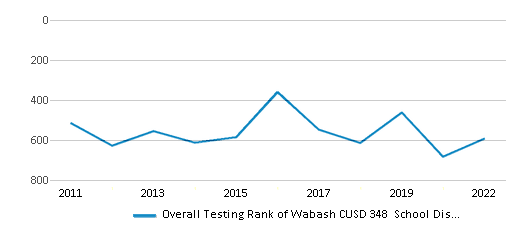
Math Test Scores (% Proficient)
(20-21)14%
28%
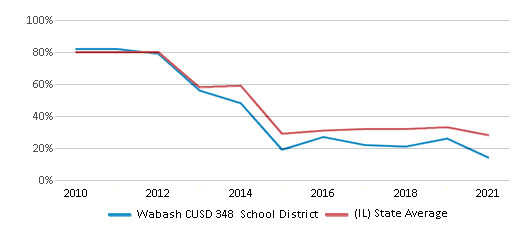
Reading/Language Arts Test Scores (% Proficient)
25%
30%
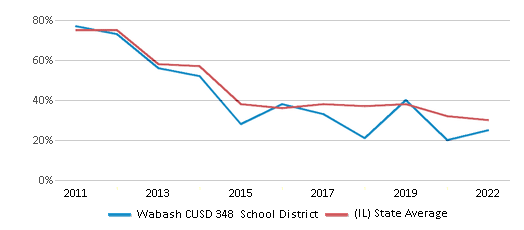
Science Test Scores (% Proficient)
52%
50%
Graduation Rate
85-89%
87%
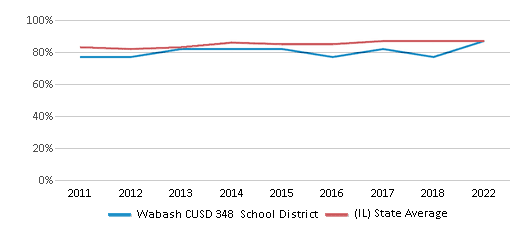
Students by Ethnicity:
Diversity Score
0.15
0.70
# American Indian Students
4 Students
4,556 Students
% American Indian Students
n/a
1%
# Asian Students
9 Students
103,630 Students
% Asian Students
1%
6%
# Hispanic Students
38 Students
517,685 Students
% Hispanic Students
3%
28%
# Black Students
15 Students
303,129 Students
% Black Students
1%
16%
# White Students
1,310 Students
837,178 Students
% White Students
92%
45%
# Hawaiian Students
6 Students
1,684 Students
% Hawaiian Students
n/a
n/a
# Two or more races Students
40 Students
78,057 Students
% of Two or more races Students
3%
4%
Students by Grade:
# Students in PK Grade:
89
79,660
# Students in K Grade:
101
120,716
# Students in 1st Grade:
98
126,380
# Students in 2nd Grade:
91
167,371
# Students in 3rd Grade:
69
130,316
# Students in 4th Grade:
98
130,337
# Students in 5th Grade:
109
129,914
# Students in 6th Grade:
106
132,189
# Students in 7th Grade:
102
135,696
# Students in 8th Grade:
111
137,626
# Students in 9th Grade:
117
149,483
# Students in 10th Grade:
116
150,499
# Students in 11th Grade:
98
146,819
# Students in 12th Grade:
117
144,755
# Ungraded Students:
-
12
District Revenue and Spending
The revenue/student of $15,814 in this school district is less than the state median of $21,990. The school district revenue/student has stayed relatively flat over four school years.
The school district's spending/student of $14,317 is less than the state median of $21,244. The school district spending/student has stayed relatively flat over four school years.
Total Revenue
$23 MM
$41,381 MM
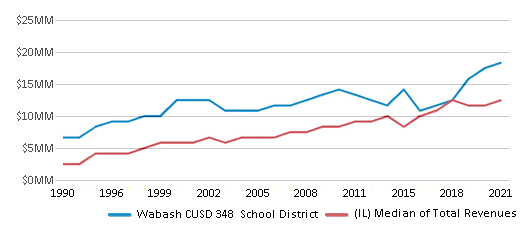
Spending
$20 MM
$39,976 MM
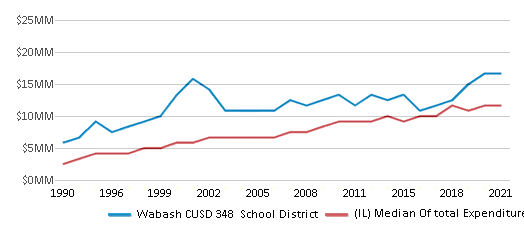
Revenue / Student
$15,814
$21,990
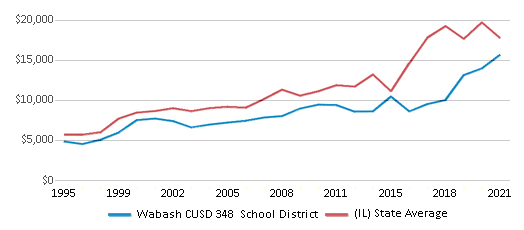
Spending / Student
$14,317
$21,244
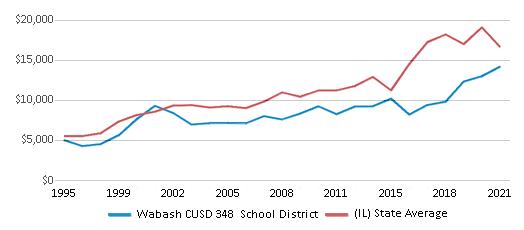
Best Wabash CUSD 348 School District Public Schools (2025)
School
(Math and Reading Proficiency)
(Math and Reading Proficiency)
Location
Grades
Students
Rank: #11.
Mt Carmel Junior High School
Rank:
5/
Bottom 50%10
201 N Pear St
Mount Carmel, IL 62863
(618) 262-8886
Mount Carmel, IL 62863
(618) 262-8886
Grades: 7-8
| 213 students
Rank: #22.
Mt Carmel Grade School
Rank:
5/
Bottom 50%10
1520 Poplar St
Mount Carmel, IL 62863
(618) 262-5699
Mount Carmel, IL 62863
(618) 262-5699
Grades: 3-6
| 382 students
Rank: #33.
Mount Carmel High School
Rank:
4/
Bottom 50%10
201 N Pear St
Mount Carmel, IL 62863
(618) 262-5104
Mount Carmel, IL 62863
(618) 262-5104
Grades: 9-12
| 448 students
Rank: n/an/a
1300 N Walnut St
Mount Carmel, IL 62863
(618) 263-3876
Mount Carmel, IL 62863
(618) 263-3876
Grades: PK-2
| 379 students
Frequently Asked Questions
How many schools belong to Wabash CUSD 348 School District?
Wabash CUSD 348 School District manages 4 public schools serving 1,422 students.
What is the rank of Wabash CUSD 348 School District?
Wabash CUSD 348 School District is ranked #592 out of 844 school districts in Illinois (bottom 50%) based off of combined math and reading proficiency testing data for the 2020-2021 school year.
What is the racial composition of students in Wabash CUSD 348 School District?
92% of Wabash CUSD 348 School District students are White, 3% of students are Hispanic, 3% of students are Two or more races, 1% of students are Asian, and 1% of students are Black.
What is the student/teacher ratio of Wabash CUSD 348 School District?
Wabash CUSD 348 School District has a student/teacher ratio of 15:1, which is higher than the Illinois state average of 14:1.
What is Wabash CUSD 348 School District's spending/student ratio?
The school district's spending/student of $14,317 is less than the state median of $21,244. The school district spending/student has stayed relatively flat over four school years.
Recent Articles

Year-Round Or Traditional Schedule?
Which is more appropriate for your child? A year-round attendance schedule or traditional schedule? We look at the pros and cons.

Why You Should Encourage Your Child to Join a Sports Team
Participating in team sports has a great many benefits for children, there is no doubt. In this article you will learn what those benefits are.

White Students are Now the Minority in U.S. Public Schools
Increasing birth rates among immigrant families from Asia and Central and South America, combined with lower birth rates among white families, means that for the first time in history, public school students in the United States are majority-minority. This shift in demographics poses difficulties for schools as they work to accommodate children of varying language abilities and socio-economic backgrounds.





